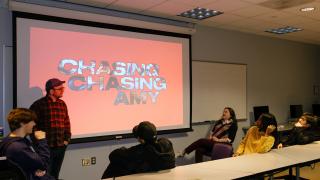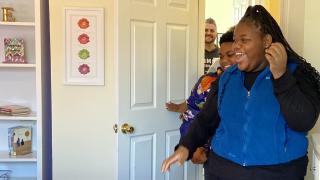
Talk to students in UM-Dearborn’s Talent Gateway program, and you’ll quickly discover that small things can have lasting takeaways. For junior Rosa Gonzalez, it was the Gateway’s “seat swap”—a popular student challenge where your only mission is to pick a different seat in class than your usual spot.
“Seems kind of simple, right?” Gonzalez said. “But I ended up meeting a couple people I’m still friends with just by doing that. And I even felt like my attention in class improved from sitting up front rather than toward the back.”
Such activities, where students do things to step outside their comfort zone, or work to develop a new skill, or experience a culture different than their own, form the backbone of the Talent Gateway philosophy. The idea is that by completing these “challenges”—and most importantly, reflecting on what they’ve learned from them—students can develop those soft, interpersonal skills that are increasingly sought after by today’s employers. Collaboration, creative thinking, tactful communication and cultural sensitivity are among the core values the Talent Gateway is trying to build up.
At any given time, dozens of UM-Dearborn students are submitting challenges. And that means inside the Talent Gateway, they always have their hands full reading, evaluating and offering feedback on the students’ reflections.
“For me, that was the really interesting part,” Gonzalez said. “Like, how they decided what to write back to you, or ask you just the right question to push you to think about something in a different way. So one day, I was in the Talent Gateway office, and I met the director, Laurie [Sutch], and she was with another student who was a Talent Ambassador. And they explained to me their process, and how it was the ambassadors that reviewed the challenges the students submitted, and even how they came up with the new challenges. I’ve always been someone who enjoys seeing the back end of things, so I thought it was really cool.”
Gonzalez applied for an opening, and shortly thereafter, claimed a spot as a Talent Ambassador herself. Ever since, she’s been pulling double duty: As a Talent Gateway participant, she’s racked up 50,000 points; and now 10 hours a week, she’s helping other students by giving feedback on their own Talent Gateway challenges.
The latter sometimes requires a soft hand. For example, a while back, she said a student submitted a challenge where many of the responses were heavily colored by the person’s religious beliefs.
“But the tricky part was, the challenge didn’t really have anything to do with religion,” Gonzalez explained. “So you have to think really hard about what you’re going to write back. On the one hand, you want to be sensitive to how important their faith is to them; but you still want them to get everything they can out of the challenge.”
In that case, Gonzalez said she and her fellow Talent Ambassadors teamed up to discuss the best approach, offered some feedback, and then gave the student another shot at the challenge responses. It’s something they do often, especially with the tough calls. And that, Gonzalez said, provides a chance to work on collaboration skills that are core to the Talent Gateway experience.
In fact, in many ways, she said being an ambassador is sort of like the graduate level version of her original Talent Gateway experience: Reading and reviewing student responses is consistent practice in learning to empathize with others’ points of view; while giving feedback to students is great training in thoughtful communication.
Gonzalez also has pitched in at the Talent Gateway in other ways. Along with her fellow ambassadors, she’s helped create new challenges. And the accounting and finance major has also put her knack for numbers to use, by helping analyze data on how students are using the Talent Gateway.
One other soft, new economy skill she’s picked up from the ambassador experience: How to hold down a virtual job. With much of the communication happening online, and the freedom to set your own hours, the temptation to let things slide is real—especially when, like Gonzalez, you’re going to school and holding down two part-time jobs.
She said keeping up with it all means setting her own weekly deadlines, blocking out time on her calendar just for her ambassador duties, and otherwise treating it like the “real” job that it is.






